 W
WAmazing Penguin is an action video game for the original Game Boy that was released in North America, Europe, and Japan.
 W
WAntarctic Adventure is a video game developed by Konami in 1983 for the MSX, and later for video game consoles, such as the Family Computer and the ColecoVision. The player takes the role of an Antarctic penguin, racing to disparate research stations owned by different countries in Antarctica.
 W
WBinary Land is a puzzle video game developed by Hudson Soft in 1983 for the MSX, FM-7, NEC PC-6001, NEC PC-8801, and in 1985 for the Famicom. The MSX version saw release in Japan by Hudson Soft and in Europe by Kuma Computers Ltd in 1984.
 W
WBloom County is an American comic strip by Berkeley Breathed which originally ran from December 8, 1980, until August 6, 1989. It examined events in politics and culture through the viewpoint of a fanciful small town in Middle America, where children often have adult personalities and vocabularies and where animals can talk.
 W
WChilly Willy is a cartoon character, a diminutive penguin. He was created by director Paul Smith for the Walter Lantz studio in 1953, and developed further by Tex Avery in the two subsequent films following Smith's debut entry. The character soon became the second most popular Lantz/Universal character, behind Woody Woodpecker. Fifty Chilly Willy cartoons were produced between 1953 and 1972.
 W
WClub Penguin was a massively multiplayer online game (MMO), involving a virtual world that contained a range of online games and activities. It was created by New Horizon Interactive. Players used cartoon penguin-avatars and played in a winter-set virtual world. After beta-testing, Club Penguin was made available to the general public on October 24, 2005, and expanded into a large online community, such that by late 2007, it was claimed Club Penguin had over 30 million user accounts. In July 2013, Club Penguin had over 200 million registered user accounts.
 W
WFrobisher is a fictional character who appeared in the Doctor Who Magazine comic strip based on the long-running British science fiction television series Doctor Who in the 1980s. He was a companion of the Sixth and Seventh Doctors.
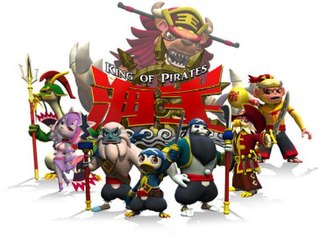 W
WKaio: King of Pirates is a cancelled video game that was in development for the Nintendo 3DS handheld video game console. Announced in 2011, it featured over three years of development before being officially cancelled on March 13, 2015. The game was being developed by Keiji Inafune and his companies Comcept and Intercept, and was to be published by Marvelous.
 W
WKid Cuisine is a brand of packaged frozen dinners targeted for children's appetites, marketed by Conagra Foods, created in 1990.
 W
WKing Dedede is a fictional character in Nintendo's Kirby video game series created by Masahiro Sakurai and developed by HAL Laboratory. Dedede first appeared in the 1992 video game Kirby's Dream Land as the main antagonist and has returned for all other games of the series except Kirby & the Amazing Mirror (2004) and Kirby and the Rainbow Curse (2015). He has also appeared in several Kirby comic books, the 2001 anime series Kirby: Right Back at Ya! and the Super Smash Bros. video game series.
 W
WThe Wrong Trousers is a 1993 British stop-motion animated short film directed by Nick Park at Aardman Animations, featuring his characters Wallace and Gromit. It is the second film featuring the eccentric inventor Wallace and his dog Gromit, following A Grand Day Out (1989). In the film, a sinister penguin named Feathers McGraw uses Wallace and Gromit's robotic "Techno Trousers" to steal a diamond.
 W
WOpus the Penguin is a fictional character created by artist Berkeley Breathed. Breathed has described him as an "existentialist penguin" and the favorite of his many characters.
 W
WOutland is a comic strip written and illustrated by Berkeley Breathed from 1989 until 1995. It was a Sunday-only spin-off of Breathed's strip Bloom County, featuring many of the same characters.
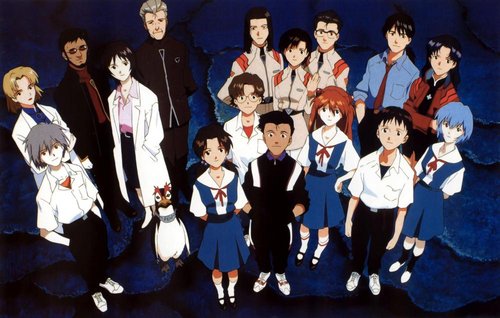 W
WThe Neon Genesis Evangelion anime series features an extensive cast of characters created by Hideaki Anno and designed by Yoshiyuki Sadamoto.
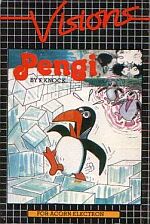 W
WPengi is a game for the Acorn Electron and BBC Micro, released by Visions Software in 1984. It is a direct clone of the 1982 Sega arcade game Pengo, even down to calling the enemies "snow bees," as in the original.
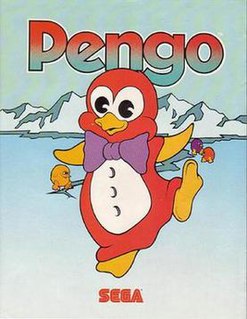 W
WPengo (ペンゴ) is an arcade game developed by Coreland and published by Sega in 1982. The player controls Pengo, a red penguin that resides in the Antarctic. The game takes place in an overhead maze made of ice blocks, where Pengo crushes blob-like Sno-Bees by sliding blocks into them. The objective is to survive each round by eliminating all Sno-Bees and Sno-Bee eggs, while optionally lining up the three diamond blocks for a large bonus.
 W
WPenguin Adventure is an action-adventure platform video game released by Konami in 1986. It is a sequel to Antarctic Adventure and has the distinction of being the first game that game designer Hideo Kojima worked on; he was an assistant designer. It has been acclaimed as one of the best MSX action games for its gameplay, depth, variety and rich pseudo-3D tile-based graphics with sprites. The story follows Penta, a penguin who has to bring home a golden apple in order to cure Penguette, the Penguin Princess.
 W
WPenguin Land, known as Doki Doki Penguin Land Uchū Daibōken in Japan, is a Master System game published and developed by Sega and is the second game in the Doki Doki Penguin Land series. In this game you play as a penguin going through a puzzle platformer stage and try to guide your egg around the polar bears, rocks and other hazards to the end of the stage. The game has a total of 50 stages and a level editor which can save up to 15 additional levels. The level editor data is stored on the game's battery back-up RAM.
 W
WPenguin Wars is an arcade game released in 1985 by UPL. It was ported to the original Game Boy (1990), MSX and Nintendo Entertainment System by ASCII under the title Penguin Wars. The Game Boy version of the game is known as King of the Zoo in Europe and Penguin-Kun Wars Vs. in Japan. The main background music in most versions of the game is an electronic rendition of "Motto Sekkin Shimasho" a song originally performed by 1980s J-Pop singer Hidemi Ishikawa .
 W
WPororo the Little Penguin is a Korean computer-animated television series created by Iconix Entertainment, SK Broadband, OCON, EBS and Channel One Russia with the animation done by Studio Gail and rendered by Seoul Animation Center. Production began in 2002 and the program began airing in South Korea on EBS in 2003.
 W
WPrinnies are a fictional race of creatures primarily in Nippon Ichi's Disgaea series of role-playing games. First appearing in Disgaea: Hour of Darkness, they have appeared in all later titles by the company, as well as on various merchandise such as hats and plush toys. With a few notable exceptions, they are voiced by Junji Majima in Japanese releases and Grant George in the English releases from Disgaea: Hour of Darkness to Disgaea 4: A Promise Unforgotten. The Prinnies are regarded as the mascots for the Disgaea series and have received generally positive reception.
The Ongoing Adventures of Rocket Llama is a webcomic starring "a high-flying llama, a sword-swinging cat, and a rocket as loyal as a cowboy hero's horse." Created by Alex Langley while he was a student at Henderson State University, the comic first appeared in a comic book titled The Workday Comic.
 W
WTennessee Tuxedo and His Tales is an animated series TV series that originally aired on CBS from 1963 to 1966. It was produced by Total Television, the same company that produced the earlier King Leonardo and the later Underdog, and primarily sponsored by General Mills. The title is a play on the “tuxedo” dinner jacket worn as formal wear.
 W
WTux is a penguin character and the official brand character of the Linux kernel. Originally created as an entry to a Linux logo competition, Tux is the most commonly used icon for Linux, although different Linux distributions depict Tux in various styles. The character is used in many other Linux programs and as a general symbol of Linux.
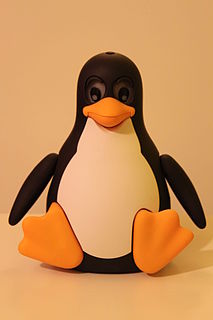 W
WTux Droid is a Linux wireless Tux mascot with a programmable interface, allowing it to announce events by its gestures and by ALSA driven sound. The events are detected by specific gadgets, which are handled by the Tux Gadget Manager. The Tux Droid supports Linux kernel 2.4 or later and needs an 800 MHz CPU and 128 MB RAM. Communication from Tux Droid to the computer is via signalling operating in the 802.11 WLAN band, but not compatible with Wi-Fi. The receiver resembles a plastic fish, and connects to the host computer's USB port. An infrared remote control is supplied; signals from this are received by Tux Droid and sent to the host software over the wireless link. For media detection it needs an internet connection. The mascot is driven by Atmel AVR RISC microcontrollers. The new version supports also Windows-based PCs. The Tux Droid can be used with Windows XP and Windows Vista.
 W
WYume Penguin Monogatari is a hybrid platform/shooter video game developed by Konami in 1991 for the Family Computer and 2006 for i-Revo.